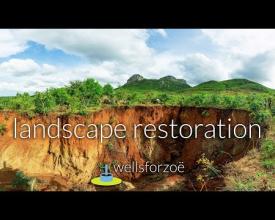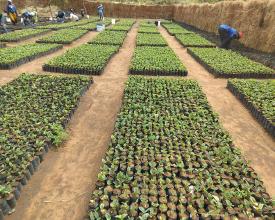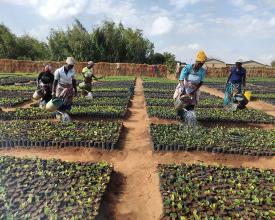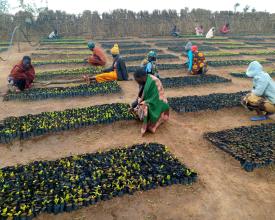
Malawi Championship – Agriculture and SWC - Wells for Zoë Soil and Forest Restoration
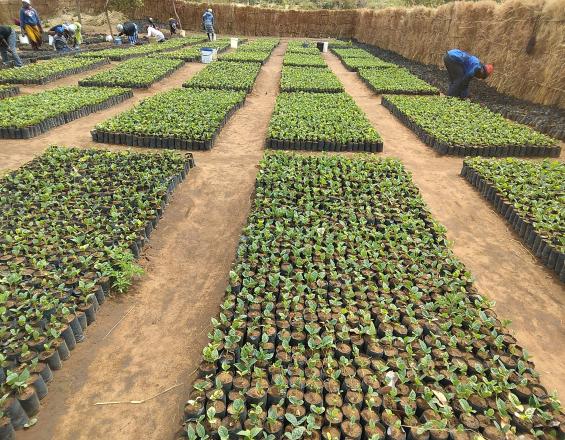
In the wider Enyezini area, Miombo Woodlands have been clearfelled and deforested, leading to substantial soil erosion threatening the livelihoods of nearby farmers.
The restoration approach is focused on active soil erosion control, implemented with locally available organic materials and simple principles by hundreds of paid community workers. Eroded areas are then covered in organic material: grasses, brush packing and mulch to provide conditions for later planted indigenous trees to thrive. Not only will this approach restore the forest cover, provide paid work for hundreds of community members, but it will reduce the threat to the livelihoods of smallholder farmers whose fields are severely threatened by erosion channels cutting into their lands. This andscape restoration approach with natural solutions will improve the water penetration of the soil allowing for groundwater storages to refill and provide a stream of life to community members in the longterm.
Context
Challenges addressed
Environmental impact: Indigenous trees grow in areas previously unsued and unsuitable for plant growth. The reduced water runoff-speed dramatically helps to accumulate biomass.
Social challenges: Land tenure is a complex topic and it has been a challenge to unite communities. The most impactful argument was that wells with pumps, installed by Wells for Zoë, already show that groundwater levels are decreasing and that if no measures would be taken, it can be expected that less and less safe drinking water can be drawn from the wells.
Economic challenges. Many farmers have previously produced charcoal illegally at the high risk of being arrested. We were able to offer hundreds of them a meaningful job: Planting trees instead of cutting them down,
Location
Process
Summary of the process
All activities are driven by our core values and we display the results in a transparent way on our own mapping platform and website. This helps to show donors, as well as our workers how serious we are about transparency and achieving a longterm sustainable impact
Building Blocks
Drone mapping and remote sensing
Inspired by our transparent way of GPS-mapping our more than 2000 installed Zoë-pumps we knew we had to apply the same principle and expand it to show and document our tree planting projects.
Now we have an elegant solution: We create GPS-Polygons of planting sites by walking around it with a simple smart phone app. We then import these boundary files into the drone mission planning app and fly a drone over the planting site capturing thousands of images.
These are then stitched into a large photogrammetric map that can transparently show and document landscape change through the work happening on the ground. Additionally all workers inspecting the sites take thousands of GPS-photos which are displayed on our custom built map as well.
Enabling factors
We are lucky enough to have a malawian team that is highly skilled and trained well enough so that we can 100% rely on their work and the results they deliver.
Apart of that it is important to have reasonable drone laws in a country, as well as having access to a drone and a pilot.
Lesson learned
In the very beginning of the drone monitoring we had to research the best workflow to map an area with no network terrain-aware. As this took a lot of time and turned out to be actually not even that complicated we wanted to share our knowledge and created a learning series on drone monitoring in cooperation with One Tree Planted and it is now freely available on youtube and covers all there is to know:
https://www.youtube.com/channel/UCuNd5k-Dy6I3qZeRh2Pj1WQ
Female empowerment
As women in rural malawian families are usually responsible to cook for their family members, they are also the ones who predominantly collect firewood, as well as to pump and carry water.
Women are therefore the ones whose training will have the biggest impact on how they perform these practices for example: If a tree is cut off at about 1m height above ground it will coppice, if however the roots are dug out to get more firewood, then a close to irreversible damage will incur, so training is very important.
By training and hiring mostly women for all steps required to restore a landscape we give them the basic tools and education to bring sustainable change to their landscape - as well as changing the basic income structures as their work often becomes the main source of income for the family.
Enabling factors
At Wells for Zoë we have women in leadership positions managing several project implementations from the Secondary Girl Student Project, and the Preschool Project where caretakers are being educated. They also visit reforestation and restoration projects and influence our hiring policy of local workers involved in the projects.
Generally speaking, being able to hire local women and pay them is a majorly important factor to enable female empowerment.
Lesson learned
Female employees and workers are grateful and report that the payment and education they receive, changes their lives to the better as they can pay schoolfees for their children and provide a richer diet for themselves and their family or start small scale businesses with the income earned.
Resources
Community engagement
We involve all stakeholders in all decision-making and invite all community members wo might be affected by projects to community meetings to ensure that there is no misunderstandings. It should be noted that we explicitly expect communities to contribute to the success of projects - be it through digging a well themselves, providing bricks when preschools are built, or taking care of planted trees.
Enabling factors
WfZ is known to be able not only to implement projects but as as well to support them after the initial successful implementation. This means, we do not only install the Zoë-pumps but we also maintain and service them. The same goes for preschools and education projects. We support projects on the long run and the communities are aware of it. Community members value this ongoing support highly and are keen to participate in learning opportunities.
Lesson learned
From our experience we highly recommend to be mindful to have some reserves left to maintain projects over a long period of time and to assume that it takes the community some time to get accustomed to manage projects themselves effiiciently. Only then can charitable work coming from outside into a community become successful and truly sustainable
Impacts
More than one million indigenous trees have been planted in the Enyezini area in the last two seasons with the Wells for Zoë. We have demonstrated that in barren areas erosion control work can improve the soil conditions to an extent that indigenous trees can be regrown.
Hundreds of community members have been trained on how to install erosion control measures in the project areas, as well as in their own farmlands to increase probability of a good harvest. More than 52,000 mandays of work has been invested into the area since April 2022. We do not only hire a majority of women to implement these activities, but also provide support for Secondary Girl Students, as well as we train carekaters in preschools.
The community members receive fruit tree seedlings from the Wells for Zoë farm as reward for successful implementation of erosion control measures and tree planting related activities - be it preparing the site or nursing seedlings in one of the five large scale community nurseries wich each having a capacity of 500,000 seedlings.
Fruit trees have been planted at the nurseries to transform the nurseries into a fruit garden over the years.
We are in the final planning stages of implementing large scale solar community kitchens at schools to reduce the amount of firewood needed.
Additionally, we pay our workers to safeguard trees and woodland.
Beneficiaries
From preschool children and their caretakers, Secondary Girl Students supported through this project to hundreds of community tree planters there are thousands of people who have directly or indirectly profited.
Sustainable Development Goals
Story
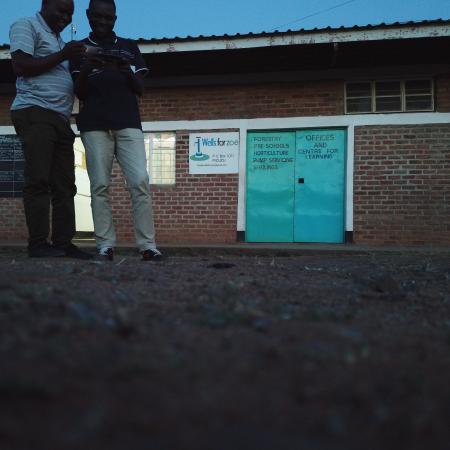
Covid 19 restrictions had a drastic impact on all our lives I suppose but for charities relying on support from abroad this was an especially challenging time.
DHL stopped delivering packages to Malawi and only residents could fly to Malawi... but we got lucky. A dutch individual living in Malawi was able to deliver a drone to Wells for Zoë. Lovemore Lemon, back then the manager of our farm and now of the whole tree planting projects, and Harisen Amin, our country director learned how to pilot a drone via videocall instructions and send back the first panoramas and photos of an indigenous nursery setup. From then on the project grew substantially in size as donors loved the fact that we had malawian pilots who could use a drone to create drone photogrammetric maps, panoramas and stunning aerial photos.

